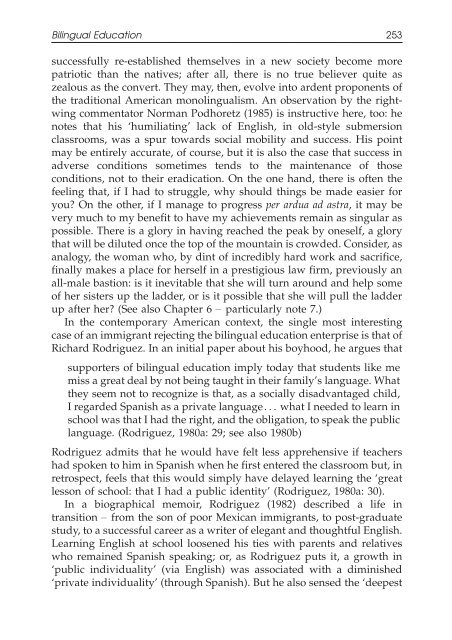Language Diversity in the Classroom - ymerleksi - home
Language Diversity in the Classroom - ymerleksi - home
Language Diversity in the Classroom - ymerleksi - home
- No tags were found...
You also want an ePaper? Increase the reach of your titles
YUMPU automatically turns print PDFs into web optimized ePapers that Google loves.
Bil<strong>in</strong>gual Education 253successfully re-established <strong>the</strong>mselves <strong>in</strong> a new society become morepatriotic than <strong>the</strong> natives; after all, <strong>the</strong>re is no true believer quite aszealous as <strong>the</strong> convert. They may, <strong>the</strong>n, evolve <strong>in</strong>to ardent proponents of<strong>the</strong> traditional American monol<strong>in</strong>gualism. An observation by <strong>the</strong> rightw<strong>in</strong>gcommentator Norman Podhoretz (1985) is <strong>in</strong>structive here, too: henotes that his ‘humiliat<strong>in</strong>g’ lack of English, <strong>in</strong> old-style submersionclassrooms, was a spur towards social mobility and success. His po<strong>in</strong>tmay be entirely accurate, of course, but it is also <strong>the</strong> case that success <strong>in</strong>adverse conditions sometimes tends to <strong>the</strong> ma<strong>in</strong>tenance of thoseconditions, not to <strong>the</strong>ir eradication. On <strong>the</strong> one hand, <strong>the</strong>re is often <strong>the</strong>feel<strong>in</strong>g that, if I had to struggle, why should th<strong>in</strong>gs be made easier foryou? On <strong>the</strong> o<strong>the</strong>r, if I manage to progress per ardua ad astra, it may bevery much to my benefit to have my achievements rema<strong>in</strong> as s<strong>in</strong>gular aspossible. There is a glory <strong>in</strong> hav<strong>in</strong>g reached <strong>the</strong> peak by oneself, a glorythat will be diluted once <strong>the</strong> top of <strong>the</strong> mounta<strong>in</strong> is crowded. Consider, asanalogy, <strong>the</strong> woman who, by d<strong>in</strong>t of <strong>in</strong>credibly hard work and sacrifice,f<strong>in</strong>ally makes a place for herself <strong>in</strong> a prestigious law firm, previously anall-male bastion: is it <strong>in</strong>evitable that she will turn around and help someof her sisters up <strong>the</strong> ladder, or is it possible that she will pull <strong>the</strong> ladderup after her? (See also Chapter 6 particularly note 7.)In <strong>the</strong> contemporary American context, <strong>the</strong> s<strong>in</strong>gle most <strong>in</strong>terest<strong>in</strong>gcase of an immigrant reject<strong>in</strong>g <strong>the</strong> bil<strong>in</strong>gual education enterprise is that ofRichard Rodriguez. In an <strong>in</strong>itial paper about his boyhood, he argues thatsupporters of bil<strong>in</strong>gual education imply today that students like memiss a great deal by not be<strong>in</strong>g taught <strong>in</strong> <strong>the</strong>ir family’s language. What<strong>the</strong>y seem not to recognize is that, as a socially disadvantaged child,I regarded Spanish as a private language... what I needed to learn <strong>in</strong>school was that I had <strong>the</strong> right, and <strong>the</strong> obligation, to speak <strong>the</strong> publiclanguage. (Rodriguez, 1980a: 29; see also 1980b)Rodriguez admits that he would have felt less apprehensive if teachershad spoken to him <strong>in</strong> Spanish when he first entered <strong>the</strong> classroom but, <strong>in</strong>retrospect, feels that this would simply have delayed learn<strong>in</strong>g <strong>the</strong> ‘greatlesson of school: that I had a public identity’ (Rodriguez, 1980a: 30).In a biographical memoir, Rodriguez (1982) described a life <strong>in</strong>transition from <strong>the</strong> son of poor Mexican immigrants, to post-graduatestudy, to a successful career as a writer of elegant and thoughtful English.Learn<strong>in</strong>g English at school loosened his ties with parents and relativeswho rema<strong>in</strong>ed Spanish speak<strong>in</strong>g; or, as Rodriguez puts it, a growth <strong>in</strong>‘public <strong>in</strong>dividuality’ (via English) was associated with a dim<strong>in</strong>ished‘private <strong>in</strong>dividuality’ (through Spanish). But he also sensed <strong>the</strong> ‘deepest
















